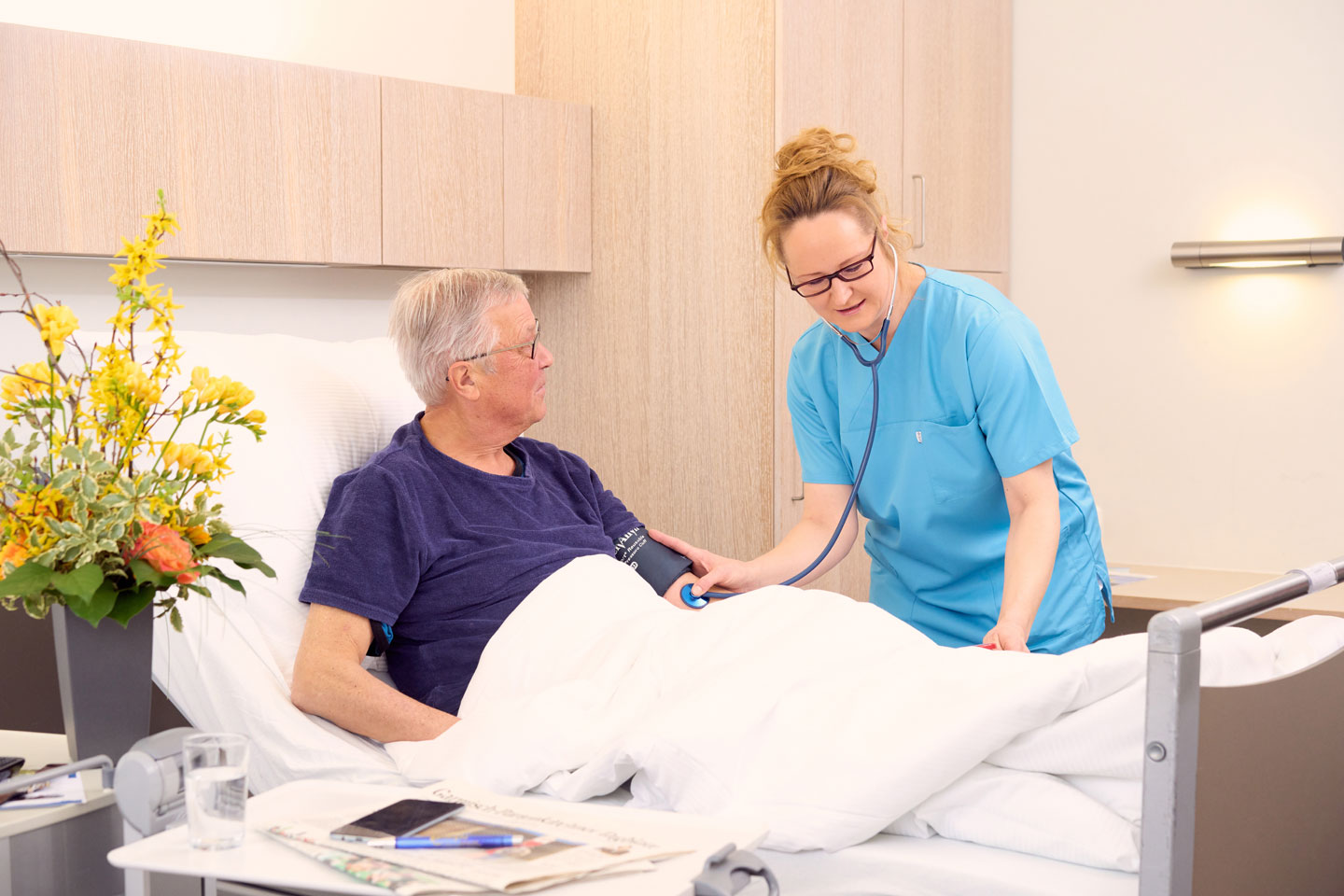OP-Vorbereitung

Aufnahmetermin
Sie werden ca. 2-3 Wochen vor dem geplanten Operationstermin durch unseren Aufnahme Center angerufen und es wird die Festlegung des genauen Aufnahmetermins geplant und besprochen. In Einzelfällen werden von uns Voruntersuchungen (Lungenröntgen, EKG, Herzecho, Labor, Gefäßstatus) verlangt und sollten vorab per Mail oder per Post an unser Aufnahme Center geschickt werden. Eine telefonische Rücksprache mit Ihrem Arzt aus der Sprechstunde ist jeder Zeit möglich.
Bitte beachten Sie, dass eine OP-Vorbereitung durch den Hausarzt nicht erforderlich ist.
Medikamente
Sollten Sie blutverdünnende oder die Blutgerinnung beeinflussende Medikamente einnehmen (z.B. ASS, Aspirin, Colfarit, Marcumar, Eliquis, NOAKs etc.) oder das Immunsystem modulierende Medikamente (z. B. Kortison über 10 mg täglich) müssen diese rechtzeitig vor dem operativen Eingriff abgesetzt werden. Bitte kontaktieren Sie Ihren Hausarzt oder uns, um den richtigen Zeitpunkt und die eventuell nötige Ersatzbehandlung zu wählen. Dies gilt nicht für Patienten, die Plavix (Clopidogrel) oder ASS 100mg wegen einer Stent-Implantation, einer Bypass-OP oder nach einem Schlaganfall einnehmen müssen.
Anreise
Die Anreise ist in der Regel am Tag vor der Operation.
Das sollten Sie zur Aufnahme mitbringen:
- Ihre Gesundheitsunterlagen (z.B. Arztberichte, Medikamente)
- Ihre Versichertenkarte
- Einen stationären Einweisungsschein Ihres Hausarztes
- Die Anschrift Ihrer Versicherung
- Die Anschrift Ihres Hausarztes
- Die Anschrift Ihres Orthopäden
- Unterarmgehstützen, falls bereits vorhanden
Aufnahme
Ihr erster Weg im Klinikum führt zur Patientenaufnahme. Bitte halten Sie dort Ihren Einweisungsschein und Ihre Versicherungskarte bereit. Danach gehen Sie in unser Aufnahme Center, das sich unmittelbar auf Ebene 1 im Haus C befindet.
Operationsvorbereitung
Die Operationsvorbereitung wird am Aufnahmetag durchgeführt. Falls sich keine Befunde ergeben, die der weiteren Abklärung bedürfen, findet die Operation in der Regel am darauf folgenden Tag statt.
Bringen Sie bitte mit ...
Neben Ihren persönlichen Sachen empfehlen wir Ihnen Folgendes mitzubringen:
- Morgenrock oder Bademantel
- Nachtwäsche
- Jogginganzug mit weitem Fußeinstieg und falls vorhanden durchgehenden Reißverschluss an der Seite.
- Feste, geschlossene Schuhe mit rutschfesten Gummisohlen, am besten Slipper (keine Schnürschuhe) und offene Schuhe (z.B. fürs Bad)
- Bei orthopädischer Schuh- bzw. Einlagenversorgung mit Außen- oder Innenranderhöhung bitte Schuhe ohne Erhöhung bzw. Einlagen ohne Achskorrektur mitbringen (Anpassung erfolgt dann postoperativ auf die neue Situation)
- Langer Schuhlöffel
- Lange Greifzange (z.B. Grillzange)
- Badekleidung
- Sonstige Hilfsmittel, die Sie bereits benutzen (z.B. Gehhilfen)
- Soweit möglich und erforderlich, bringen Sie bitte Behälter für Zahnersatz, Kontaktlinsen etc. mit.
- Aufenthalt
- Wir versuchen Ihnen den Aufenthalt so angenehm wie möglich zu gestalten. Dank moderner, renovierter Zimmer werden Sie sich sicher wohl fühlen. Zusätzlich steht Ihnen ein Team aus Gesundheits- und Krankenpflegern, Ärzten, Service- Assistenten und Physiotherapeuten zur Verfügung.
Operationstag
Am Operationstag erhalten Sie vor der OP eine spezielle Waschlotion. Mit dieser sollten Sie vor der Operation duschen und die Haut vor möglichen schädlichen Bakterien gründlich reinigen. Zu gegebener Zeit fahren wir Sie mit Ihrem Bett zum Operationssaal und Sie werden vom OP-Personal empfangen. Nach dem Umstieg auf einen fahrbaren Operationstisch werden Sie in einen Vorbereitungsraum gebracht. Nach der Narkoseeinleitung geht es in den eigentlichen Operationssaal, ausgestattet mit modernster Lamina Airflow Technik. Dort verantworten drei bis vier unserer Mitarbeiter die Durchführung der Operation.
Nach der Operation geht es zunächst in den Aufwachraum, um Ihre Kreislaufparameter nach der Operation zu überwachen. Nach etwa ein bis zwei Stunden dürfen Sie wieder in Ihr Zimmer.
Seien Sie nicht überrascht, bereits am Operationstag können Sie auf Ihrem neuen Gelenk stehen und erste Schritte gehen. So senken Sie durch die Bewegung und mit der Unterstützung von Medikamenten zur Blutverdünnung Ihr Thromboserisiko.
Vorbereitungstraining
Für eine optimale trainingstherapeutische OP-Vorbereitung bieten wir an unserem Institut für Bewegungsanalyse und Sportmedizin eine umfassende Diagnostik mit verschiedenen Untersuchungsverfahren an. Anhand der Testergebnisse können gezielte, individuelle Therapie- und Trainingsempfehlungen bis zum OP-Termin gegeben werden. Die Trainingstherapie sollte zusammen mit einem Therapeuten erfolgen, um eine exakte Übungsausführung und somit ein effektives Training sicherzustellen.
Folgende Übungsbeispiele können bei einer effektiven OP-Vorbereitung helfen:
Übungsprogramm für Hüfte & Knie: